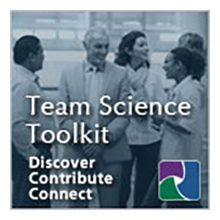Choose Your Own Adventure Session: Collaborations Across Cultures and Communities
Tuesday, August 2, 2022
4:30 PM - 5:30 PM ET
|
Inclusion Nudges in Team Science
Yulia Levites Strekalova
Abstract: This presentation will provide a conceptual and practical overview of the inclusion nudges in team science. Numerous reports on the career development and progress in biomedical science quote lack of connection and integration as one of the reasons for the low representation racial and ethnic minorities among tenure-track and research faculty. We propose that intentional inclusion is an effective communication and program planning strategy applicable in this context. In this talk we will provide an overview and examples of the application of the inclusive wording, talk time tracking, and anonymous resources tools that can be used by the teams to create nudges and structures for the promotion of diversity and inclusion among interdisciplinary research teams.
|
|
Further Divided Gender Gaps in Research Productivity and Collaboration during the COVID-19 Pandemic
Meijun Liu
Abstract: Based on publication data on coronavirus-related fields, this study applies a difference in differences approach to explore the evolution of gender inequalities before and during the COVID-19 pandemic by comparing the differences in the numbers and shares of authorships, leadership in publications, gender composition of collaboration, and scientific impacts. We find that, during the pandemic: (1) females' leadership in publications as the major contributor was negatively affected; (2) although both females and males published more papers relative to the pre-pandemic period, the gender gaps in the share of authorships have been strengthened due to the larger increase in males' authorships; (3) publications by mixed-gender collaboration declined; (4) papers by teams in which females play a key role were less cited, and this citation disadvantage was exacerbated during the pandemic; and (5) gender inequalities regarding authorships and collaboration were strengthened in the initial stage of COVID-19, widened with the increasing severity of COVID-19, and returned to the pre-pandemic level in September 2020. This study shows that females' lower participation in teams as major contributors and less collaboration with their male colleagues also reflect their underrepresentation in science in the pandemic period. This investigation significantly deepens our understanding of how the pandemic influenced academia, based on which science policies and gender policy changes are proposed to mitigate the gender gaps.
|
|
Using the Arts to Flip Understanding: A Workshop for New Perspective
Veronica Stanich
Abstract: Many workshops and interventions proliferating across Team Science, and higher education in general, rely directly or indirectly on practices and approaches associated with design thinking. A range of institutions have demonstrated the efficacy of such design thinking-inspired activities for research teams, especially in STEMM disciplines, and we wonder: What do the practices and approaches of the arts (different from design) have to offer researchers in non-arts fields?One answer is new perspective; engaging with other disciplines helps us see and understand even familiar content differently. We hypothesized that the arts could afford new perspective to STEMM researchers who don't usually engage arts practices, jump-starting their thinking and even helping them with a "stuck place"—a conundrum that bogs down their work. Finding little research to support that hypothesis, we designed a workshop experience to explore its possibilities.The workshop asks its participants to take on the artist's practice of making, creating micro works of art in movement, literary, and visual forms that use a stuck place in their current work or research as thematic material. Participants toggle between an open-ended, exploratory approach and a more critical one, analyzing and interpreting the micro-artworks they make.We have given the workshop four times, both online and in-person, surveying participants every time. Demonstrated in both ranked and open-ended questions, almost all participants think about familiar things in unfamiliar ways, make something that's useful to their thinking, and advance their thinking on an issue; indeed, the process seems to help many come "unstuck." Integrating artists into STEMM teams is one way the arts can enhance STEMM research; early results from our workshop indicate that another may be the use of arts practices by STEMM researchers themselves.
|
|
Institutionalizing Interdisciplinarity and Transdisciplinarity: Lessons for Team Science from Collaborations across Cultures and Communities
Bianca Vienni Baptista
Abstract: Increased interest in interdisciplinarity (ID) and transdisciplinarity (TD) has heightened calls for institutionalizing structures and strategies that cross boundaries of expertise both within and beyond the academy. This Lightning Talk draws lessons for team science from a new book featuring fifteen original case studies, by exploring how ID and TD have been institutionalized with emphasis on insights for research collaboration. The rhetoric of transformation in the case studies and in pertinent literature beckons profound change in research and education. However, barriers and disincentives familiar to team-science scholars persist. The case studies identified forms of and insights about collaborative research from five continents of Asia, Africa, Australia, Europe, Latin America, and North America. A multitude of strategies and models of change emerged along four dimensions: personal and professional, academic/epistemological, institutional, and socio-political. We also considered five subthemes present in the cases: spanning historical and geographical contexts, temporal and spatial organization of research and teaching, degrees of change from modifications to transformations, theories or philosophies of institutional change, and factors helping or hindering institutionalizing processes and dynamics. Drawing from the cases, we provide a heuristic framework for tackling continuing and future challenges posed by different relations at the intersections of cultures, institutions, and communities in institutionalizing inter- and trans-disciplinarity. Our Lightning Talk will begin by stating the scope of the case studies, the four dimensions, and the five subthemes. We will then describe strategies, methods, and institutional forms of inter- and trans-disciplinary approaches to research collaboration in the cases. The primary themes for team science in general and this conference, in particular, are institutional policies, best practices for collaboration, and inter- and trans-disciplinary approaches to real-world problem solving.
|
|

